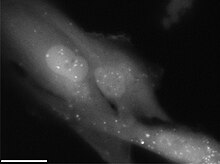
Back متلازمة الإشعاع الحادة Arabic آکوت رادیاسیون سندرومو AZB Прамянёвая хвароба Byelorussian Прамянёвая хвароба BE-X-OLD Остра лъчева болест Bulgarian তীব্র বিকিরণ সিনড্রোম Bengali/Bangla Síndrome d'irradiació aguda Catalan Akutní radiační syndrom Czech Strålesyge Danish Strahlenkrankheit German
| Acute radiation syndrome | |
|---|---|
| Other names | Radiation poisoning, radiation sickness, radiation toxicity |
 | |
| Radiation causes cellular degradation by autophagy. | |
| Specialty | Critical care medicine |
| Symptoms | Early: Nausea, vomiting, skin burns, loss of appetite[1] Later: Infections, bleeding, dehydration, confusion[1] |
| Complications | Cancer[2] |
| Usual onset | Within days[1] |
| Types | Bone marrow syndrome, gastrointestinal syndrome, neurovascular syndrome[1][3] |
| Causes | Large amounts of ionizing radiation over a short period of time[1] |
| Diagnostic method | Based on history of exposure and symptoms[4] |
| Treatment | Supportive care (blood transfusions, antibiotics, colony stimulating factors, stem cell transplant)[3] |
| Prognosis | Depends on the exposure dose[4] |
| Frequency | Rare[3] |
Acute radiation syndrome (ARS), also known as radiation sickness or radiation poisoning, is a collection of health effects that are caused by being exposed to high amounts of ionizing radiation in a short period of time.[1] Symptoms can start within an hour of exposure, and can last for several months.[1][3][5] Early symptoms are usually nausea, vomiting and loss of appetite.[1] In the following hours or weeks, initial symptoms may appear to improve, before the development of additional symptoms, after which either recovery or death follow.[1]
ARS involves a total dose of greater than 0.7 Gy (70 rad), that generally occurs from a source outside the body, delivered within a few minutes.[1] Sources of such radiation can occur accidentally or intentionally.[6] They may involve nuclear reactors, cyclotrons, certain devices used in cancer therapy, nuclear weapons, or radiological weapons.[4] It is generally divided into three types: bone marrow, gastrointestinal, and neurovascular syndrome, with bone marrow syndrome occurring at 0.7 to 10 Gy, and neurovascular syndrome occurring at doses that exceed 50 Gy.[1][3] The cells that are most affected are generally those that are rapidly dividing.[3] At high doses, this causes DNA damage that may be irreparable.[4] Diagnosis is based on a history of exposure and symptoms.[4] Repeated complete blood counts (CBCs) can indicate the severity of exposure.[1]
Treatment of ARS is generally supportive care. This may include blood transfusions, antibiotics, colony-stimulating factors, or stem cell transplant.[3] Radioactive material remaining on the skin or in the stomach should be removed. If radioiodine was inhaled or ingested, potassium iodide is recommended. Complications such as leukemia and other cancers among those who survive are managed as usual. Short term outcomes depend on the dose exposure.[4]
ARS is generally rare.[3] A single event can affect a large number of people,[7] as happened in the atomic bombings of Hiroshima and Nagasaki and the Chernobyl nuclear power plant disaster.[1] ARS differs from chronic radiation syndrome, which occurs following prolonged exposures to relatively low doses of radiation.[8][9]
- ^ a b c d e f g h i j k l m "A Fact Sheet for Physicians". CDC. CDC Radiation Emergencies Acute Radiation Syndrome. 22 April 2019. Archived from the original on 18 May 2019. Retrieved 17 May 2019.
- ^ "Beir VII: Health Risks from Exposure to Low Levels of Ionizing Radiation" (PDF). The National Academy. Archived from the original (PDF) on 2020-03-07. Retrieved 2019-12-02.
- ^ a b c d e f g h Donnelly, EH; Nemhauser, JB; Smith, JM; Kazzi, ZN; Farfán, EB; Chang, AS; Naeem, SF (June 2010). "Acute radiation syndrome: assessment and management". Southern Medical Journal. 103 (6): 541–546. doi:10.1097/SMJ.0b013e3181ddd571. PMID 20710137. S2CID 45670675. Archived from the original on 2019-06-26. Retrieved 2019-06-24.
- ^ a b c d e f "Radiation Sickness". National Organization for Rare Disorders. Archived from the original on 12 August 2019. Retrieved 6 June 2019.
- ^ Xiao M, Whitnall MH (January 2009). "Pharmacological countermeasures for the acute radiation syndrome". Curr Mol Pharmacol. 2 (1): 122–133. doi:10.2174/1874467210902010122. PMID 20021452.
- ^ Chao, NJ (April 2007). "Accidental or intentional exposure to ionizing radiation: biodosimetry and treatment options". Experimental Hematology. 35 (4 Suppl 1): 24–7. doi:10.1016/j.exphem.2007.01.008. PMID 17379083.
- ^ Acosta, R; Warrington, SJ (January 2019). "Radiation Syndrome". Treasure Island, FL: StatPearls. PMID 28722960. Archived from the original on 2022-09-22. Retrieved 2023-05-09.
- ^ Akleyev, Alexander V. (2014). "chronic%20radiation%20syndrome"&pg=PA1 Chronic Radiation Syndrome. Springer Science & Business Media. p. 1. ISBN 978-3642451171.
- ^ Gusev, Igor; Guskova, Angelina; Mettler, Fred A. (2001). Medical Management of Radiation Accidents. CRC Press. p. 18. ISBN 978-1420037197.
© MMXXIII Rich X Search. We shall prevail. All rights reserved. Rich X Search